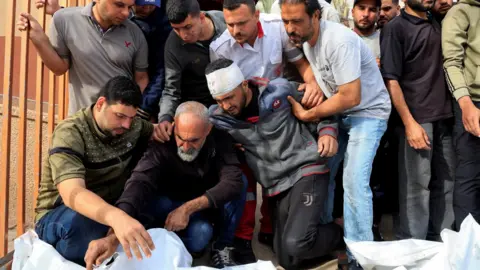The ongoing conflict in Gaza has escalated dramatically, with recent Israeli airstrikes resulting in the deaths of at least 114 Palestinians, according to health officials and rescue organizations. This devastating statistic comes amidst a reported intensification of Israeli bombardment targeting locations believed to be associated with Hamas militants. The strikes seem poised as a precursor to an anticipated expansion of the Israeli ground offensive, raising considerable concerns regarding civilian safety and humanitarian conditions in the region.
On the same day, US President Donald Trump was in the region, while indirect talks continued regarding a potential ceasefire and the release of hostages held by Hamas. Following these developments, Marco Rubio, the US Secretary of State, expressed disquiet over the deteriorating humanitarian situation in Gaza. He emphasized that while they recognize the suffering of the affected populace, the Trump administration also maintained its support for Israel’s military efforts directed towards Hamas, which they consider a terrorist organization.
The ongoing military actions have left Gaza in a desperate humanitarian crisis. An Israeli blockade, in place for over ten weeks, has severely limited food, medical supplies, and other critical aid, exacerbating the plight of half a million people facing starvation, as reported by various agencies. Rubio reiterated calls for Hamas to surrender, categorizing its existence as an obstacle to peace. In counter statements, Hamas accused Israeli Prime Minister Benjamin Netanyahu of sabotaging peace efforts through deliberate military escalation.
As the conflict raged, southern Gaza, particularly Khan Younis, witnessed some of the most lethal air strikes. Local reports indicated that many casualties included women and children, with entire families being annihilated in an instant. Accounts from residents illustrated the harrowing aftermath, describing overwhelmed hospitals and the struggles of medical staff to cope with the influx of severely injured individuals. Survivors recounted how entire families were lost within moments, underlining the tragic toll the violence has taken.
One of the most heartbreaking stories was from Safaa al-Bayouk, who recounted the loss of her two young sons during an air strike. She described the regularity of life just before the strike, highlighting the stark contrast between normalcy and sudden devastation. Another poignant account came from Reem al-Zanaty, who described waking up covered in debris after her home was struck, needing rescue from her father. The human experiences of loss and grief are woven throughout countless narratives emerging from this conflict.
The focus of Israeli military operations has not solely been southern Gaza. Reports indicate that northern regions, such as Beit Lahia and Jabalia, have also experienced extensive bombardment. Local sources document the grim recovery efforts, with teams rescuing bodies from the rubble of what were once homes and community centers. One specific incident in Jabalia exemplified the toll on medical facilities, where an airstrike on a clinic resulted in multiple civilian casualties, prompting outrage and despair among local residents.
Amidst the chaos, the international response remains complex. A controversial plan for US-Israeli aid distribution has been announced, despite significant criticisms regarding its humanitarian implications. Furthermore, Israel’s governmental representatives have spoken about the necessity of military pressure on Hamas concurrent with negotiations for hostage releases, revealing the juxtaposition of military action and diplomatic efforts in this multifaceted conflict.
As of May 15, 2025, an estimated 53,010 fatalities in Gaza have been attributed to the ongoing hostilities since the resumption of conflict, indicating the profound human cost associated with this enduring struggle. In light of international laws, there have been urgent calls for Israel to facilitate the entry of humanitarian aid to Gaza, a fundamental necessity for those affected by the blockade and military operations. The Israeli government maintains that it is upholding international obligations, yet grim realities on the ground paint a contrasting picture of human suffering and loss.
As violence continues and the search for a peaceful resolution remains elusive, the plight of the people in Gaza highlights the urgent need for targeted humanitarian efforts, meaningful diplomatic negotiations, and an end to the cycle of violence that has claimed thousands of lives.



